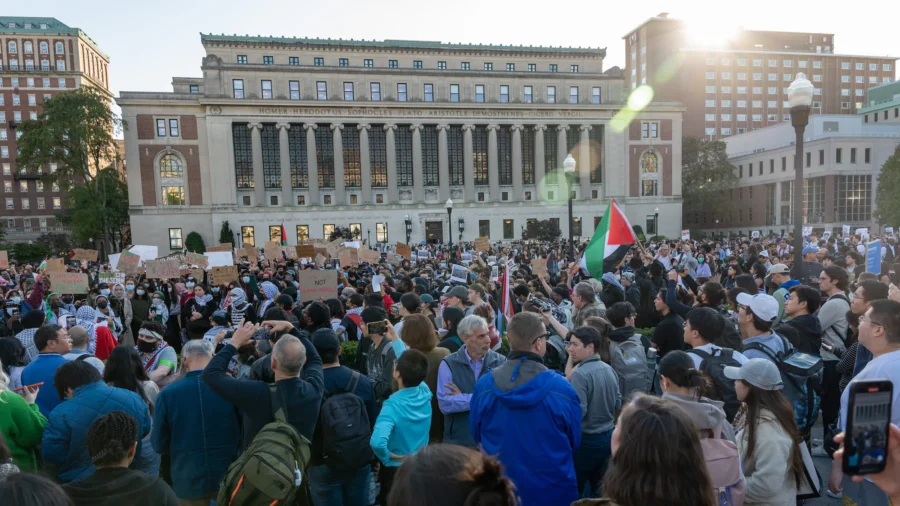Columbia University initiated the suspension of students participating in a pro-Palestinian encampment on campus who remained past the latest deadline, amidst mounting pressure on the school’s president.

The university in New York City had urged students to voluntarily dismantle the encampment by 2 p.m. ET Monday or face suspension and the inability to complete the semester. Despite the passing of the deadline with many tents still in place, Columbia announced it would begin suspending some protesters while reiterating its call for demonstrators to vacate the area.
“We will not be moved unless by force,” stated Sueda Polat, a Columbia graduate student and encampment organizer, during an earlier student news briefing.
Details regarding how students would be notified of their suspensions, which are expected to revoke their access to school facilities and potentially impede their ability to take final exams, remained unclear.
The encampment, now entering its third week, has sparked similar protests at colleges nationwide, leaving university officials grappling with how to respond. Many Jewish students have expressed feeling unsafe on campus amidst a rise in antisemitism, while protesters maintain their demonstrations are peaceful.

The atmosphere on campus was subdued Monday evening, with individuals in the encampment either retreating to their tents or engaging in quiet conversations. Earlier in the day, several hundred protesters had marched around the main plaza, voicing support for Palestinians and Gaza.
Notably, more than two dozen prominent Columbia alumni and donors, including a former board of trustees chair, issued a rebuke to university president Minouche Shafik for her perceived failure to manage campus protests and curb antisemitism. In an open letter to Shafik, the alumni demanded the removal of illegal encampments and swift disciplinary action against students involved in hate speech and threats.
The letter, which garnered over 100 signatures by Monday afternoon, included notable figures such as Lisa Carnoy, a former Bank of America executive, and David Friedman, former U.S. ambassador to Israel under Donald Trump.
Despite Shafik’s reaffirmation on Monday that the university would not divest from Israel and her insistence that protesters vacate the premises or face consequences, the alumni criticized her for not taking stronger action.
The situation at Columbia University reflects broader tensions across college campuses, with protests erupting over the Israel-Hamas conflict and schools struggling to balance free speech rights with campus security.

Meanwhile, a Columbia sophomore, Jonathan Lederer, voiced concerns over the university’s handling of the protests and questioned why action hadn’t been taken following the 2 p.m. deadline. Lederer noted that many of his friends felt unsafe returning to campus and expressed feelings of alienation.
A Jewish student at Columbia filed a lawsuit against the university, alleging that it failed to create a safe environment for Jewish students by allowing the encampment to persist. The university declined to comment on the lawsuit.
Additionally, a group of 21 House Democrats called on Columbia’s board of trustees to dismantle the encampment, citing concerns over discrimination and harassment.
Despite ongoing protests, Columbia University’s last day of classes proceeded as scheduled, with student demonstrators maintaining their presence on the lawn ahead of finals week.
The university expressed reluctance to cancel graduation events, contrasting with the University of Southern California’s decision to cancel its main commencement ceremony due to security concerns.
As tensions continue to simmer on campus, both students and university administrators grapple with finding a resolution amidst competing interests and demands.